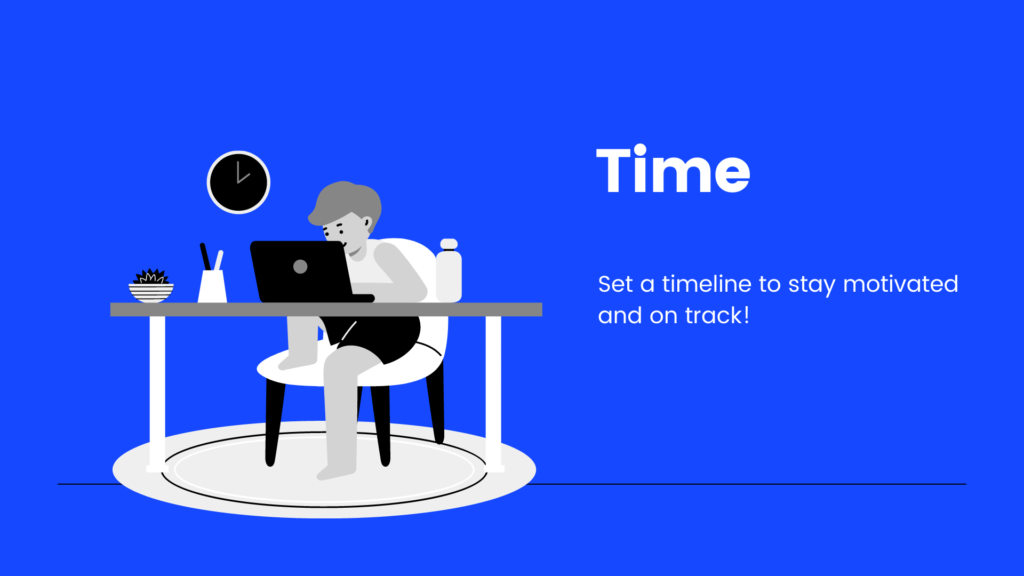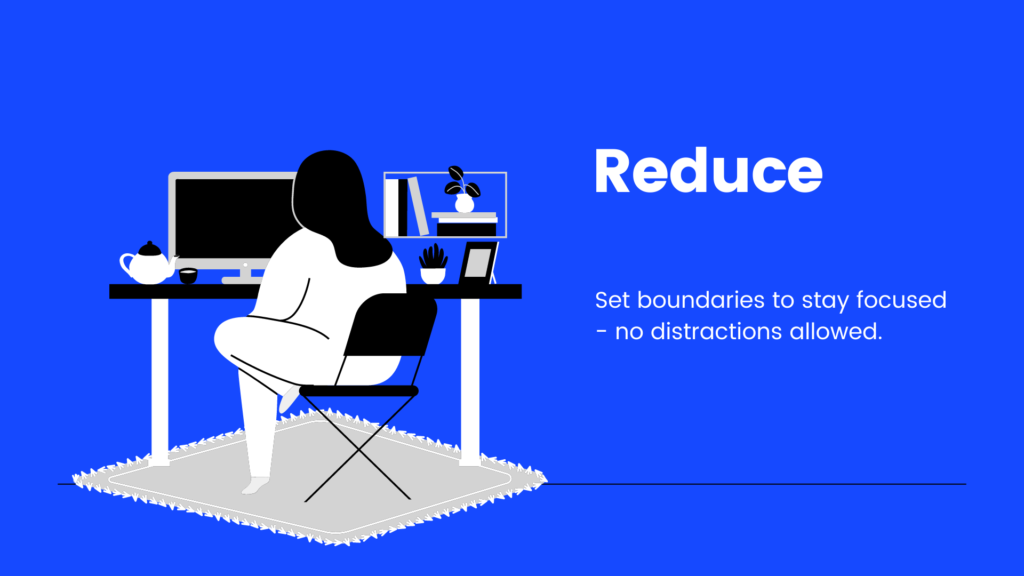Skills for Life
Insight, Information & Inspiration
How to Stay Focused

Why is It So Hard to Stay on Track?
The path to success can be challenging, but it can be done! Our brains are naturally wired towards short-term gratification and away from pain, making long-term plans hard to stick with. But don’t let this discourage you – staying the course for any endeavor requires a strong mindset backed by tangible steps and support systems like accountability partners or professional help.
Why is It Important to Stay on Track?
Staying on track to achieve any meaningful goals or dreams is essential. When you are consistent with your actions, you are more likely to make progress and see results that can help you feel motivated and inspired to keep going. Consistency is critical when developing new habits and reaching desired outcomes. Studies have shown that establishing a new practice takes approximately 66 days, but this timeline can be shortened if one consistently reinforces the behavior daily.
Additionally, Isaac stresses that consistency fosters discipline, determination, and accountability, contributing to overall success. When you focus on making small changes daily, those changes add up over time and have a lasting impact on achieving bigger goals. Furthermore, research has shown that consistent effort leads to better performance over time than sporadic effort – so staying consistently focused will make a difference in the long run.

What is the Secret to Staying Focused?
Isaac’s secret to staying focused lies in developing a powerful motivation, a clear action plan, and a strategy for dealing with distractions. An underlying solid reason why you want to achieve your goal will help you remain consistent and progress towards your objectives. To ensure that this motivation remains strong, it is important to regularly reflect on why the goal is important to you and visualize yourself reaching it.
- Create a Plan
Creating a plan of action helps break down larger goals into smaller tasks, which presents less daunting challenges and makes them easier to complete. It also enables you to hold yourself accountable for completing the items on your checklist. Additionally, having a schedule outlining when these tasks should be completed can help keep you on track and prevent procrastination.
- Strategies for Managing Distractions and Staying Focused
Isaac said, “It is important to recognize any potential distractions that may arise (e.g., social media) and develop strategies for combating them.” For example, setting time limits for certain activities or using apps to block distractions can help keep the focus on track while achieving those goals.
- The Importance of Motivation and Planning in Achieving Goals
Research has consistently shown the importance of motivation in achieving long-term goals and high levels of consistency in behavior; according to one study published by the American Psychological Association (APA), “goals that are self-motivating are associated with greater effort, persistence, and improved performance.” Additionally, research has found that having an organized plan and strategies for managing distraction are essential components of staying focused; one study published by the International Journal of Educational Research found that “structured planning leads to the increased focus on task completion.”

How Do You Accomplish Large Goals?
Achieving a critical goal initially seems overwhelming, but it can become much more manageable with a systematic and strategic approach. According to Isaac, breaking down a big goal into smaller steps is a crucial strategy for success. Doing so lets you focus on each task individually and progress steadily toward your ultimate goal.
Achieving a critical goal initially seems overwhelming, but it can become much more manageable with a systematic and strategic approach. According to Isaac, breaking down a big goal into smaller steps is a crucial strategy for success. Doing so lets you focus on each task individually and progress steadily toward your ultimate goal.

1. Break the Goal Down Into Smaller, More Manageable Pieces
Achieving a critical goal initially seems overwhelming, but it can become much more manageable with a systematic and strategic approach. According to Isaac, breaking down a big goal into smaller steps is a crucial strategy for success. Doing so lets you focus on each task individually and progress steadily toward your ultimate goal.
2. Identify Potential Roadblocks or Issues
When breaking a goal down into smaller steps, it’s essential to be realistic about potential roadblocks or obstacles that may arise. This could include a lack of resources, unexpected setbacks, or competing priorities. By identifying these potential roadblocks in advance, you can develop strategies for addressing them and minimizing their impact on your progress toward the goal.
3. Set Measurable Goals for Each Step
To track your progress toward the larger goal, it’s important to set measurable goals for each of the smaller steps you have identified. This could include setting specific deadlines for completing each degree, identifying milestones or deliverables to indicate progress, or quantifying particular outcomes or results you hope to achieve. By setting measurable goals, you can more easily track your progress, adjust as needed, and celebrate your successes.


Establishing timelines is an essential part of achieving any goal. Without clear deadlines and a plan for accomplishing each step, it can be easy to become overwhelmed or lose motivation. You can stay focused and motivated throughout the process by breaking down larger goals into smaller, more manageable steps and setting specific deadlines for completing each.
This section explores three critical strategies for establishing timelines to help you stay on track and motivated as you work toward your goals.
1. Set Specific, Achievable Deadlines
Setting specific, achievable deadlines for completing each step or milestone is crucial when establishing timelines for achieving a goal. These deadlines should be realistic but challenging enough to keep you motivated and on track.
2. Use Visual Aids
When Isaac breaks a goal down into smaller steps, he stresses the importance of being realistic about potential roadblocks or obstacles that may arise. This could include a lack of resources, unexpected setbacks, or competing priorities. By identifying these potential roadblocks in advance, Isaac believes in developing strategies for addressing them and minimizing their impact on your progress toward the goal.
3. Reassess and Adjust as Needed
Finally, it’s essential to reassess your timeline and adjust it as needed periodically to reassess your timeline and modify it as regularly required. This could involve revising deadlines based on changes in circumstances or progress or reevaluating the specific steps or tasks involved in Finally, it’s essential to reassess your timeline and adjust it as needed periodically to reassess your timeline and modify it as regularly required. This could involve revising deadlines based on changes in circumstances or progress or reevaluating the specific steps or tasks involved in

How Do You Decide What to Focus on?
In today’s fast-paced world, it’s easy to feel overwhelmed by the multitude of tasks and goals competing for our attention. However, choosing the proper focus is essential for progressing and achieving our desired outcomes.
In this section, we’ll explore some effective strategies for deciding what to focus on, including tips from Isaac.
1. Clarify Your Priorities
The first step in deciding what to focus on is to clarify your priorities. Reflect on what matters most to you and what you hope to achieve in the short and long term. Isaac recommends creating a list of your top goals and reviewing them regularly to ensure that your actions align with your priorities.

2. Assess Urgency and Importance
Once you’ve clarified your priorities, the next step is to assess the urgency and importance of each task or goal. According to Isaac, one practical approach is to use a matrix like the Eisenhower Matrix, which helps you categorize tasks based on their urgency and importance. This can help you prioritize your time and energy effectively and focus on the most critical tasks.
3. Consider the Potential Impact
Finally, when deciding what to focus on, it’s essential to consider the potential impact of each task or goal. Ask yourself the potential benefits or consequences of completing or not completing each task. Isaac recommends considering the long-term implications of each mission or purpose and focusing on those likely to have the most significant positive impact on your life or work.


How Do You Stay Organized?
Staying organized is critical for achieving your goals and staying on top of your responsibilities. However, with so many tasks and deadlines to manage, it can take time to keep everything in order.
In this section, we’ll explore some effective strategies for staying organized, including tips from productivity expert Isaac and details about using tools like Asana and Trello.
1. Create a Task List in a Task Management Tool
One of the most effective ways to stay organized is to use a task management tool like Asana or Trello. These tools allow you to create task lists, assign deadlines, and track progress on multiple projects simultaneously. Isaac recommends using a task management tool to keep all your tasks and projects in one place and avoid getting overwhelmed by numerous lists or pieces of paper.
2. Use Those Tools to Break Down Large Projects
Another effective way to stay organized is to break down large projects into smaller, more manageable tasks. This makes the project feel more achievable and helps you stay focused and avoid getting distracted by other tasks or priorities. Isaac recommends breaking down each project into tasks and assigning deadlines using your task management tool.
3. Use the Tools to Prioritize Ruthlessly
Finally, to stay organized, it’s essential to prioritize ruthlessly. This means focusing your time and energy on the most critical tasks and avoiding getting sidetracked by less important ones. Isaac recommends using a tool like the Eisenhower Matrix to help you prioritize tasks based on their urgency and importance. This can help you focus on the charges with the most significant impact and avoid wasting time on less critical tasks.


How Do You Set Boundaries to Reduce Distractions?
With endless distractions vying for our attention, it’s essential to establish boundaries to minimize disruptions and maximize productivity. Whether studying for an exam, working on a project, or trying to complete a personal goal, setting clear boundaries can help you stay on track and accomplish more in less time.
This section explores some tips for setting boundaries to reduce distractions and maintain focus.
1. Create a Distraction-Free Environment
One of the most effective ways to minimize distractions is to create an environment conducive to focused work. This might mean finding a quiet workplace, using noise-canceling headphones, or turning off notifications on your phone or computer. Isaac recommends using apps like Forest or Freedom to block distracting websites or social media during work sessions.
2. Establish Clear Boundaries with Others
Another key to staying focused is to establish clear boundaries with others. This might mean letting your coworkers or family know when you’ll be working and asking them not to interrupt you. It could also involve setting specific times for checking email or responding to messages rather than constantly being available.
3. Take Regular Breaks
Another key to staying focused is to establish clear boundaries with others. This might mean letting your coworkers or family know when you’ll be working and asking them not to interrupt you. It could also involve setting specific times for checking email or responding to messages rather than constantly being available.


How Do You Monitor Your Progress?
Monitoring your progress is a critical step in achieving your goals. It allows you to track your performance, identify areas where you need improvement, and make necessary adjustments to stay on track.
Here are three things you can do to monitor your progress effectively.
1. Measure Your Goals
Setting measurable goals is essential to monitor progress. When you have clear, specific, and quantifiable goals, you can track your progress and determine whether you’re on track or need to make adjustments. Isaac recommends setting your dreams using the SMART (Specific, Measurable, Achievable, Relevant, Time-bound) framework.
2. Track Your Metrics
Tracking your metrics is a great way to monitor your progress. By measuring your progress with specific metrics, you can see how far you’ve come and how much further you must go. Please choose the most relevant metrics to your goal and track them consistently. For example, if you aim to run a marathon, you might track your pace, distance, and heart rate. Isaac recommends using a spreadsheet or a tracking app to monitor your metrics and adjust as needed.
3. Regularly Review Your Performance
Regularly reviewing your performance is crucial to monitor your progress. It allows you to reflect on your achievements, identify areas for improvement, and make necessary adjustments. Isaac recommends setting aside time each week to review your progress and identify any obstacles or distractions hindering your progress.

Set Your Aims High
"The greater danger for most of us lies not in setting our aim too high and falling short; but in setting our aim too low, and achieving our mark." Michelangelo BuonarrotiTweet
Michelangelo Buonarroti Tweet
Congratulations! You have completed the course on how to master the art of goal-setting and focus. By following the eight secret hacks we have covered, you now have the tools and strategies to set and achieve your goals quickly. Remember to remember your dreams, break down tasks, set deadlines, prioritize tasks, use technology, manage distractions, and monitor your progress. By doing so, you will stay on track and accomplish your goals. We hope this course has been valuable and wish you the best of luck in all your future endeavors!
Please share this article and the presentation below with others who can use this information to pursue greatness.
Isaac's Closing Questions
- What is the first step you will take to apply the tips you learned in this course to your own goals?
- How will you hold yourself accountable to stay on track and maintain focus as you work towards achieving your goals?

